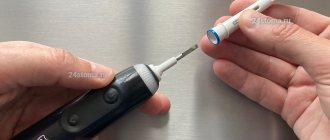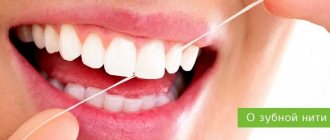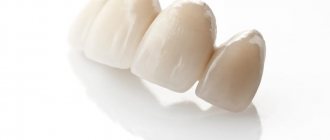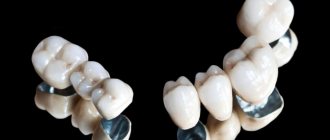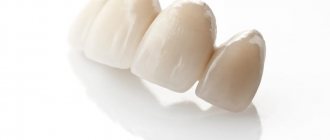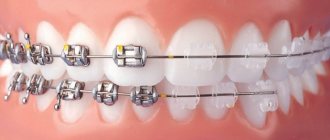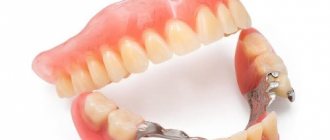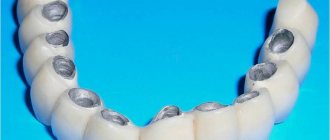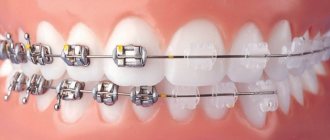Principle of operation
An irrigator is a device for caring for the oral cavity. During its operation, liquid under pressure enters the reservoir. And then the nozzle sets it in the desired direction - to those areas of the oral cavity that we cannot treat with a brush or dental floss. The liquid pulsates, thereby cleaning the teeth, including the spaces between them, the tongue, and the gums. If you use the irrigator for dental care correctly, your hygiene will be of the highest quality.
Experts also approve of the irrigator as a care device for dentures and orthodontic structures.
How to choose the cleaning mode and water pressure
When cleaning your mouth with an irrigator, you should not forget about the correct operating mode. First of all, this is the pressure of the water jet, which is adjusted with a special button or control knob. Even the simplest and cheapest models can work in two versions - strong and weak.
During the initial period of use, the gums may not react correctly to external influences. Therefore, at this stage, the minimum gentle regimen should be used. Gradually, the mucous membrane and the entire cavity will get used to this pressure, and after 1-2 weeks it will completely adapt to it. If there is no discomfort, you can gradually increase the power of the supplied jet.
Strong pressure does not always provide the desired result. If you have hypersensitivity or diseases of the mucous membrane, you should not use the maximum mode to avoid serious injury to the gums. If it is not possible to consult a dentist on this matter, it is recommended to rely on your own feelings.
When to use an irrigator?
One of the most popular questions: how often can you use a waterpik? The answer is simple - every time after brushing your teeth.
But if you are a person who wears braces or has bridge structures, then you should use the irrigator more often - every time after eating. Because food gets stuck and remains in the mouth.
Another important rule is that you need to use the device constantly. And then it will really be the prevention of gum disease and effective hygiene of the entire cavity, which a toothbrush alone cannot provide.
Varieties
In order to satisfy the needs of device users, irrigators are produced in various configurations, with different specialized attachments. Irrigators are either stationary or portable. The stationary one can be installed in the bathroom, and the portable one can be taken with you on vacation or a business trip. There are models with the ability to adjust the mode and additional options, for example, with the generation of small bubbles for a softer and more effective cleansing. Some models of irrigators can be connected to a water supply, others operate from a built-in reservoir.
What to put in the irrigator?
What to put in the irrigator?
You can fill the irrigator with:
- The clean water we drink;
- Saline solution;
- Balms.
In this case, we use water at room temperature. If you use a irrigator with hot water, the device will quickly break down. And too cold water damages tooth enamel.
We do not recommend using a dental irrigator with herbal decoctions, as deposits form in the device and caring for it becomes difficult. You will have to clean the sediment often.
Dentists advise pouring balms, which have a number of advantages:
- Fight bacteria;
- Helps cope with inflammatory processes;
- Makes your breath fresh;
- Does not leave microparticles;
- Does not form foam or sediment.
Types of solutions
Conventionally, special solutions for the oral cavity are divided into three groups:
- Professional – liquids with a therapeutic effect for inpatient treatment (often high concentration). The drug is prescribed by a doctor for therapy or in the postoperative period.
- Household – for the treatment and prevention of dental diseases at home. The concentration of active components here is lower than that of professional ones; they are used for daily care.
- Homemade - herbal preparations of medicinal plants for the complex treatment of diseases of the oral cavity.
Based on the principle of action, solutions for irrigators are:
- Therapeutic - with fluoride and calcium to strengthen enamel and treat caries.
- Preventive – with beneficial elements for gums and teeth, they prevent possible pathologies, saturate the enamel with minerals, and destroy pathogenic microflora.
- Deodorants - with mint or menthol for everyday care, provide long-lasting fresh breath.
- Disinfectants – with antiseptics that destroy dangerous bacteria and are used to prevent dental diseases.
Which attachments will be useful for you?
Irrigator attachments
- Standard. Suitable for those who do not have any special diseases or installed structures in the mouth. These are nozzles without bristles. They look like bent tubes at an angle, they wash food well and cope with plaque. Typically, manufacturers offer 2 standard attachments in a set;
- Orthodontic. The same bent tubes at an angle, but with bristles. The best option for braces and other similar systems. The liquid paired with bristles cleans the interdental spaces well, removes plaque, and also takes care of braces;
- Periodontal. Needed for periodontal pockets. Thanks to the soft tip, when you use the irrigator to clean your teeth, it does not injure your hypersensitive gums. But such a nozzle cannot be maintained with high pressure, so that the tip does not fly off. The pressure in the nozzle itself is already calculated and high pressure is not needed here;
- Brush attachments for plaque. Accordingly, they help remove plaque on various structures. At the same time, the nozzle is not a replacement for a brush;
- Tongue attachments. They have the shape of a spoon, which allows you to effectively remove plaque from the tongue, cheeks, and palate;
- Brush attachments. That is, it is a toothbrush along with water under pressure. Cleans teeth and other structures well. You can use it every day, but do not replace a regular brush with this attachment;
- Nasal attachments. For cleaning the nasal cavity.
Watch the video from experts on how to choose nozzles for your irrigator.
Where can I buy
Carefully study the composition and expiration date before purchasing.
Professional solutions for irrigators are sold by representatives of pharmaceutical companies, which, as a rule, work exclusively with dental clinics.
Household liquids are freely available. Today, they can be easily purchased in household chemical and hygiene stores, pharmacies, and also in online stores.
When purchasing liquid for an irrigator by any means, you should pay special attention to its expiration date, manufacturer and composition. This will avoid the use of low-quality products that may be produced by illegal companies.
Can I give a waterpik to a child?
Irrigator for children
Yes, children can also use an irrigator. But this needs to be done when there is a parent nearby and with minimal pressure. It is also important that the child has his own brush head, just like a toothbrush.
Before using an oral irrigator, watch our video with your child. This way, the baby will not be afraid of the device and will understand its benefits and operation together with you.
The best liquids
Household solutions can be found in virtually any store. They are presented in a large assortment. The following irrigator balms have the best effect:
- Irix is one of the most popular varieties of concentrate for irrigators. It contains menthol, so your breath remains fresh for a long time. Constant use of Irix will prevent the formation of caries and stop bleeding gums. An important advantage of the solution is the absence of foam during the irrigation procedure.
- Donfil is produced both for preventive purposes and for therapeutic purposes as a means of regular use. The balm was created on a natural basis. Among the main components are lemon balm, mint, chamomile, St. John's wort, echinacea and calendula. The main advantage of the concentrate is the absence of alcohol, so it can be used even by children.
- Albadent is a product with a universal effect. It is used for prevention and as a means of regular use. Albadent concentrate allows you to remove inflammation, reduce tooth sensitivity, stop bleeding gums, strengthen enamel and freshen breath.
- Asepta liquid is used primarily for irrigators with a wide range of functions. It contains components that allow you to qualitatively eliminate deposited plaque and remove inflammation. Aspeta is often bought as a means to combat tartar. In the early stages of their development, the product helps most effectively.
- Professor Persin is based on medicinal herbs and does not contain fluoride. It can be used daily to prevent gingivitis and caries. If there are foci of inflammation, the product quickly eliminates them and accelerates the regeneration process.
Read also: Professional teeth cleaning air flow
How to clean braces with an irrigator?
An irrigator complete with special attachments is the best device for caring for the orthodontic system. While wearing braces, it is correct to use the irrigator for cleaning as follows:
- Start brushing with the last teeth in the row;
- Take care of each brace separately, and clean the clasps and other parts of the system that are close to the teeth especially carefully;
- Finish the procedure with care between the teeth and gums.
And at the end, rinse your mouth with a balm-rinse or an antiseptic solution, since while wearing the systems, your lips and cheeks are usually inflamed.
Watch the video on how to clean braces with an irrigator and more. Do it correctly and regularly!
Operating principle
The essence of the principle of operation of the irrigator is quite simple: liquid (water or solution) is poured into a special container of the device, the compressor creates pressure, and when you press the button, a stream escapes from the tip. Getting on the teeth, gums, tongue, palate, it “knocks down” microparticles adhering to the mucous membrane and washes them away. The person can only spit out the waste liquid.
Important: the liquid in the device is supplied under pressure, so people who have any acute inflammation of the mucous membranes of the gums, tongue, cheeks and lips are not recommended to use the irrigator for a hygienic procedure.
Mode of application
When using liquids for their intended purpose, they are simply diluted according to the attached instructions and poured into the irrigator.
Most types of solutions intended for irrigators can be used without a device as a mouth rinse. The only point you need to pay attention to before use is following the instructions. Solutions are mainly created in the form of concentrates, so they often need to be diluted with water.
Before using solutions, you need to pay attention to the following nuances:
- in fact, all concentrates should be diluted with water 1:10;
- The procedure can be carried out every day;
- the solution can be used to rinse the mouth without an irrigator, the procedure lasts 1 minute;
- The concentrate should be diluted in the same ratio as when poured into the irrigator.
The best mouth rinses for hyperesthesia (increased sensitivity) of teeth
Lacalut sensitive
The German LACALUT sensitive mouth rinse is a prime example of excellent quality at a reasonable price. Reduces the sensitivity of enamel to hot and cold, sweet and sour. Protects sensitive teeth from caries, strengthens gums. In addition to amino fluoride, the drug contains aluminum lactate with a pronounced astringent effect and an antiseptic, which requires use for no more than 21 days. Main advantages:
- Reduces tooth sensitivity well
- refreshes the oral cavity,
- helps cope with bleeding gums.
Minuses:
- The bottle lasts for a short time.
Since many rinses contain antiseptics or alcohol, it is not recommended to choose them yourself. In order for the effect of the rinse to be maximum, you need to contact a dentist to determine the problems of the oral cavity and carry out complete sanitation (treatment of all dental diseases) and professional hygiene.
Indications and contraindications for use
The irrigator has no absolute contraindications. But there are still a number of restrictions that are best followed so as not to harm your teeth and gums. You should not use the device if:
- serious problems in the functioning of the cardiovascular system,
- postoperative period in the treatment of dental diseases,
- excessive bleeding of the gums when using the irrigator for more than 12-14 days,
- age restrictions - not recommended for preschool children,
- the appearance of neoplasms in the oral cavity.
Also, the irrigator is contraindicated during exacerbation of periodontitis or immediately after the installation of fixed structures.
Indications for the use of a modern oral cavity protection device are:
- Elimination of bad breath - effective if the cause of the smell is tobacco or intense soft plaque on the teeth. If the reason is the presence of diseases of the teeth or throat, then only eliminating its causes will help eliminate this smell,
- prevention of the development of diseases that contribute to the appearance of gingivitis, as well as the development of gingivitis during pregnancy and lactation - the irrigator promotes effective cleansing of hard-to-reach places from plaque, as well as high-quality cleaning of dental crowns. With regular use, such problems will not arise,
- prevents the aggressive development of periodontitis - due to the effective cleaning of periodontal pockets from pathogenic microorganisms that can provoke a worsening of the situation,
- helps to thoroughly clean orthodontic devices such as braces - for this purpose the set includes special attachments that facilitate the cleaning procedure,
- facilitates the recovery period after implantation - the massage effect created by the use of irrigators relieves swelling and eliminates pain. In addition, it efficiently cleans bridge structures.
Among other things, irrigation helps reduce gum bleeding, helps fight halitosis and reduces the risk of caries .
Undoubtedly, the use of irrigators has great benefits for maintaining oral health. It is the first choice treatment for people suffering from periodontal disease.
Maintains dental health by effectively removing plaque in hard-to-reach places, preventing the development of caries and the proliferation of pathogenic microflora. They have a healing effect if you use not just water, but special solutions :
- furatsilin,
- antibacterial rinse,
- herbal decoctions,
- chlorhexidine.

